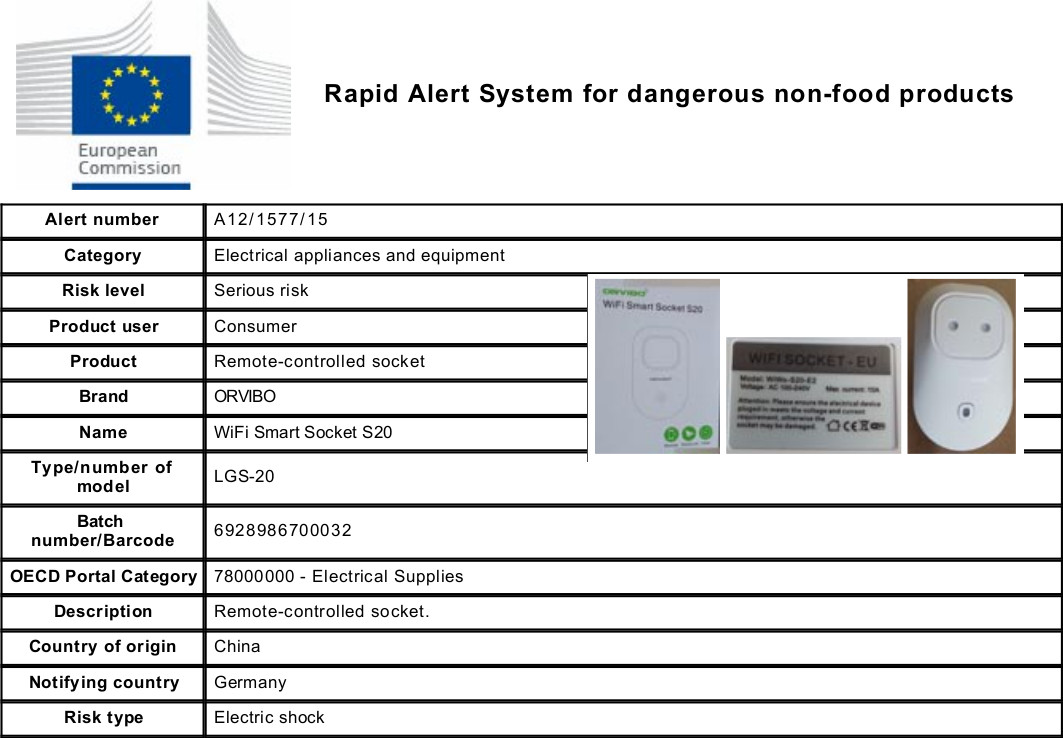Orvibo Wiwo S20 is a WiFi smart socket that can be controlled by a smartphone and some people are using it with OpenHAB open source automation software. The socket has four versions with with US, UK, EU or AU plug types, and some of my clever readers mentioned that the European plug was mot likely NOT compliant with European regulations, was likely dangerous, and should be limited to 2.5A instead of 10A. It turns out they were right, as the European commission issued a safety notice last declaring Orvibo Wiwo S20 to be dangerous with risk of electric shock.

The document further explains:
The shape of the socket is not correct: when a plug is inserted the live pins of the plug are accessible. Appliances which should be earthed can be connected to the socket but the socket itself is not earthed. The product does not comply with the requirements of the Radio Equipment and Telecommunications Terminal Equipment Directive.
and they took measures to ban the product:
Measures ordered by public authorities: Ban on the marketing of the product and any accompanying measures, Recall of the product from end users.
So while they certainly have authorities against European companies, the European plug is still being sold on DX.com, GearBest, and other online sellers. That means the product could be confiscated at customs, and obviously it’s dangerous to use, especially for high powered appliances that should be grounded.
Orvibo Wiwo S20 socket is not the first, and won’t be the last product that fail to meet safety requirements, as I explained in one article entitled “Why Do UL and CE Certifications Matter For Anything That Connects to the Mains (110V/220V) ?” Sadly, there’s not much consumers can do to make sure they buy a safe product, although purchasing electrical appliances from global brands may help avoid getting into troubles.

Jean-Luc started CNX Software in 2010 as a part-time endeavor, before quitting his job as a software engineering manager, and starting to write daily news, and reviews full time later in 2011.
Support CNX Software! Donate via cryptocurrencies, become a Patron on Patreon, or purchase goods on Amazon or Aliexpress





same story with all the chinese plug adapters, not isolated pins
Visually isn’t it obvious that device fails to be safe for European devices?
AIUI only sockets designed only to take 2-pin unearthed devices should be recessed in a Europlug shape recess that means only 2-pin un-earthed Euro-plugs can be inserted, and earthed round plugs cannot? That has no socket recess and no earth contact – so cleary fails by looking at it doesn’t it?
Looks to me as if it was designed by someone who didn’t have even a basic grasp of Electrical Safety and European standards?
(This is also a problem in Denmark ISTR – where their 3 pin sockets allow earthed Schuko and similar plugs to be connected with no earth connection)
@Steve
It’s obvious if you know the rules.
@Steve
Well, it’s fine for use with Euro plugs visually, although these are only rated up to 2.5A.
“Rapid alert system for dangerous non-food products”…
Phew, thank god this one went through the _rapid_ alert system. These plugs appeared around mid-2014.
There are multiple ETL/UL testing companies in Shenzhen.
Please start using them before you kill someone.
These labs know all of the safety standards. Go get a certification and be safe. Stop trying to save a few thousand dollars avoiding this.
I don’t think it’s ‘knowing the rules’ that is the problem, it’s knowing basic safety… If you call basic engineering standards – and complying with international standards ‘rules’ then you’re basically saying ‘It’s obvious if you are an engineer’…
It’s interesting watching PSU teardowns – there are some horrifically dangerous USB power supplies coming out of China (at least one I saw tested had 240V on the USB connector shell).
Have a look at this : https://www.youtube.com/watch?v=3Hdn0MuCK_0 (bigclivedotcom does great PSU tear downs)
And compare it to the well engineered IKEA USB charger here : https://www.youtube.com/watch?v=uRe9w5PKmsE
I’e played with the searching engine the EU website @ http://ec.europa.eu/consumers/consumers_safety/safety_products/rapex/alerts/main/index.cfm?event=main.search
and even Apple products are not always safe: http://ec.europa.eu/consumers/consumers_safety/safety_products/rapex/alerts/main/index.cfm?event=main.notification&search_term=A11/0014/16&exclude_search_term=0&search_year=2016